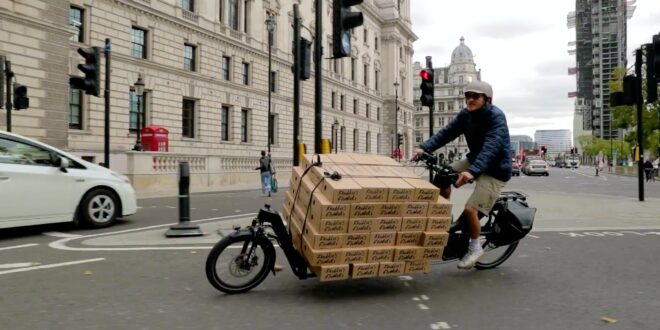Fully Charged’s Dan Parsons tells Rebecca Morley why e-cargo bikes are growing in interest and how they are helping businesses become more efficient
E-cargo bikes have a host of benefits that make them perfect for city deliveries, taking up less road space than vans, easing congestion and improving a company’s efficiency. And with many businesses looking for more sustainable methods of transporting goods, the rising popularity of electric comes as no surprise.

Earlier this year Fully Charged opened its new e-bike service centre in central London, which, in addition to the workshop’s six e-bike stands and two e-cargo bays, also houses an e-cargo showroom, showcasing offerings from the likes of Urban Arrow, Butchers & Bicycles, Tern Bicycles and Riese and Müller.
“Our focus has always been on the service and support of our customers,” says Dan Parsons, founding partner and head of business at Fully Charged. “Our workshop is ten times bigger than the showroom, and we’re all about looking after the client. Anyone can sell you an e-bike – it’s the ongoing service and support that’s so incredibly important.
“A proportion of it is actually an electric cargo showroom. And these are big machines, far bigger than you might imagine, and so you need a lot of space to be able to not only show and allow budding businesses to see, learn and try them, but also service them.
“The electric cargo bike side of things has come from nowhere, over the last probably three years. We might have [previously] got two calls every couple of months, it’s now multiple calls a day about electric cargo.”
eCargo Bike Grant Fund
September saw Fully Charged host an event showcasing the Energy Saving Trust’s eCargo Bike Grant Fund at the central London e-cargo showroom, with opportunities to see and trial a range of e-cargo bikes and learn from businesses already reaping the benefits.
The DfT and its delivery partner Energy Saving Trust recently announced a £400,000 funding round to help and support small businesses investing in e-cargo bikes. Funding covers up to 40% of the total cost of an e-cargo bike, up to a maximum of £2,500 for two-wheel models and £4,500 for three-wheel models, with applications capped at five bikes per organisation.
“It’s come about really because of a response to the rise in interest in electric cargo bikes in the UK now,” explains Parsons. “If the stats are correct, about 2,000 electric cargo bikes were reportedly sold in the UK last year, and that number is about 80,000 in Germany.
“It’s an enormous potential sector for growth. And we have a very big percentage of that 2,000 units in the UK. That’s really fun and exciting but it requires the service centre backing to be able to effectively service and support those clients because that is their business, and keeping those bikes on the road is absolutely prudent for them. It’s not like hobbyists being without their bike for a week between rides, these guys rely on it day to day.”
Parsons says there are a number of reasons for the rise in interest in e-cargo bikes, but it’s mostly come out of necessity through infrastructure changes, and also policy and legislation, certainly in the city. “We’ll take London as an example because it’s our local city,” says Parsons. “You have the congestion charge, which has risen, you’ve got ULEZ, which has risen in cost and also increasing in its diameter around London, so any highly emitting vehicles are being taxed considerably through those two things.
“You’ve got rising fuel costs and you’ve got an increase in congestion. The pandemic has meant that e-commerce has boomed – you’ve got the likes of Amazon needing more delivery methods, and they’ve mostly gone into white vans, but then those white vans have restricted access into areas of the city which they literally can’t get to.
“The e-cargo bike has allowed these businesses to continue delivering the same number of parcels, or more, to areas which the vans now can’t get to, or can get to, but take longer and it’s incredibly expensive. E-cargo bikes can park right outside the customer, right outside the pick-up place, and not have to go round and pay exhaustive parking fees.
“There’s also been an increase in awareness now – we’re seeing more of them on the road. Stats by the Active Travel Academy, which is part of the University of Westminster, quote electric cargo bikes as being 60% more efficient than vans. A European study said that 51% of freight deliveries services in urban centres could be replaced by electric cargo bikes. That’s a very big number – so the rise in electric cargo bikes is enormous.”

Part of the struggle though, Parsons continues, is trying to sell businesses a new, not yet understood technology. Delivery companies know how a white van works, but to offer a new technology and a new way of doing business is something that takes some education in order to prove it can work.
“What typically happens is they’re going ‘£8,000 for a bike, are you mental?’ They don’t understand that the cargo bike at £8,000 is a direct replacement of their white van, which actually costs them considerably more, not only to buy, but to run and maintain, and you need tax, MOT and insurance etc.
“Once you’ve convinced them that it might be a good idea, they then dip their toes in and buy one or two, and the decision is made easier by the grant, and they’re going ‘oh my God, why have we never done this before?’”
Upward trajectory
The rising numbers of people walking and cycling have been well reported since COVID-related restrictions began, with the pandemic causing enormous gains across the board. But e-bikes were on an upward trajectory already, says Parsons.
“I think what the pandemic did is just accelerated the change. It also brought a lot of change in infrastructure, so we had COVID cycle lanes coming in. There were a lot fewer cars on the road – a lot of people felt safer to go on and cycle, and therefore there was an uptick through that as well.
“There has also been a perfect storm the other way because we’ve had the most shocking of supply periods. In my nearly 15 years in the industry, in electric bikes, I’ve never had a period like it. It’s been devastating and the growth could have been significantly higher if there hadn’t been all the issues that the industry experienced through lack of availability and lack of supply. COVID has increased it and throttled it at the same time.”
Speaking to the suppliers, most of them are saying that they need another year to recover, Parsons says, and then we’re not going to get to any form of normality until at least the end of next year.
“The suppliers’ suppliers are struggling. They’ve already put their pre-orders in and they’re designing stuff for this next year.
“And many of our suppliers are capping us with the number of e-bikes that we can buy, which is incredibly frustrating because as a business we obviously want to continue to grow but the stock clearly isn’t there, or certainly of the bike that we want to be marketing, promoting and selling.”
But many businesses across different industries are also having the same issues – and at least it’s better this way than the other way round, Parsons says.
“It’s a nice problem to have but it’s a problem nonetheless, and it’s a very costly problem because when our phone rings 300 times a day, a large proportion of those are ‘any news on my bike?’ You’re paying for staff to be sitting answering calls on behalf of the suppliers. It’s very difficult and very costly, but it is what it is.”
But one good thing about working with commercial businesses is that their bikes are on the road nearly 24/7, so more e-bikes being seen on the road is a good thing for everybody, including consumers, Parsons concludes.
“We’re fully invested in this side of the business and I cannot wait to see what the next 12-18 months has to offer.”
 BikeBiz Bicycle and cycling retail news
BikeBiz Bicycle and cycling retail news




